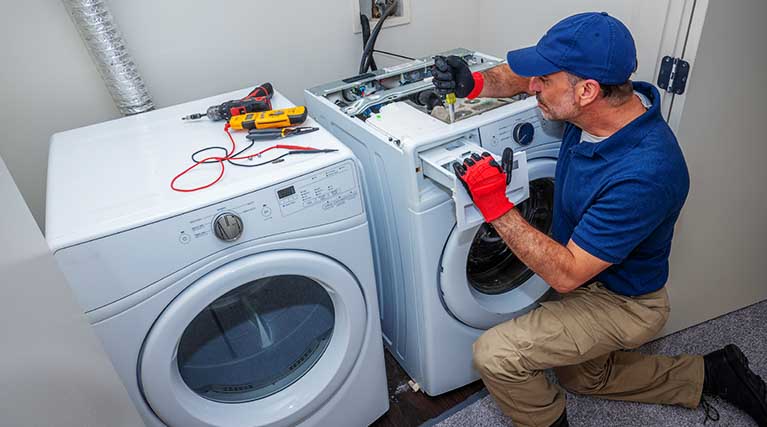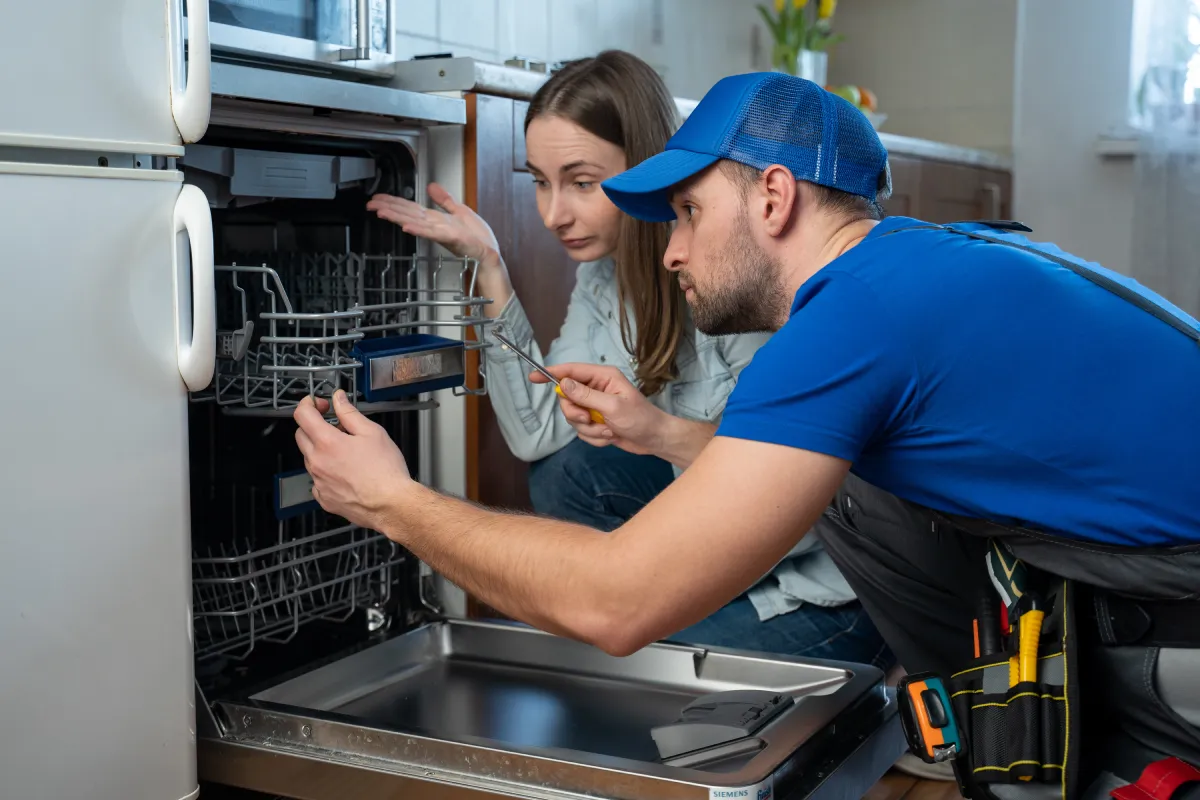The Ultimate Overview to Recognizing Home Appliance Fixing in the house
When your refrigerator quits cooling or your oven declines to warmth, it can feel frustrating. Comprehending appliance repair at home can conserve you time and money. You'll learn to acknowledge symptoms, use essential tools, and comply with a methodical troubleshooting process. Yet prior to you begin, there are essential security precautions you need to consider. What are one of the most common troubles, and how can you repair them? Let's discover the fundamentals.
Usual Home Appliance Issues and Their Symptoms
When your appliances begin acting up, it's important to recognize the signs at an early stage. Disregarding them can result in larger problems and costly repairs. As an example, if your refrigerator isn't cooling down effectively, you may discover warm areas or condensation creating. This can suggest a stopping working compressor or an obstructed vent.Your dishwashing machine may reveal troubles via dirty dishes or uncommon sounds throughout cycles. If you hear grinding or clanking, it's time to investigate.A washing equipment that will not spin or drain can leave you with soaked washing, recommending a clogged drain or a malfunctioning pump.Lastly, if your oven's temperature level seems off or it takes for life to preheat, you could be managing a malfunctioning thermostat. By staying sharp to these signs, you can address issues before they intensify right into significant fixings.
Vital Tools for Device Repair Work
When you're dealing with home appliance repairs in your home, having the right tools is important. Basic hand tools like screwdrivers and pliers will aid you take apart and take care of numerous devices, while electrical testing devices guarantee you're functioning securely with circuitry. Allow's go over what you need to get going on your fixing trip.
Fundamental Hand Tools
Having the right devices is essential for reliable device repair at home. Begin with a reliable screwdriver set, including both flathead and Phillips kinds, as screws prevail in device setting up. Pliers are additionally important; they assist with gripping, twisting, and reducing cables or small components. A set of needle-nose pliers can reach limited places conveniently. You'll need a good flexible wrench for tightening up or loosening nuts and screws. An energy blade is convenient for puncturing packaging or insulation. Ultimately, do not fail to remember a durable workbench or surface area to securely organize your devices and components. With these basic hand devices, you'll be well-prepared to deal with most device repairs that come your means.
Electrical Screening Tools
Along with fundamental hand tools, electrical screening tools play an essential duty in device repair work. These devices assist you detect electric concerns and assurance appliances work safely. A multimeter is vital; it determines voltage, existing, and resistance, allowing you to determine issues quickly. A non-contact voltage tester is another must-have, allowing you detect live wires without making straight contact, enhancing your safety. Clamp meters are wonderful for determining existing flow in wires without detaching them, saving you time and initiative. Additionally, circuit testers can swiftly examine if electrical outlets are functioning effectively. By utilizing these gadgets, you'll enhance your troubleshooting process and enhance your fixing abilities, making device upkeep a whole lot less complicated.
Step-by-Step Overview to Diagnosing Device Issues
When your home appliance acts up, it can be irritating, but identifying the concern doesn't have to be overwhelming. You'll discover to identify typical problems and apply reliable troubleshooting techniques. Allow's go through the steps to obtain your appliance back in working order.
Common Appliance Issues

Repairing Strategies Explained

Fixing Major Cooking Area Devices: A Closer Look
Have you ever questioned exactly how to tackle common problems with your cooking area home appliances? Fixing significant kitchen area appliances like refrigerators, stoves, and dishwashing machines can be much easier than you assume. Begin by determining the problem-- whether it's a fridge not cooling or an oven that will not warm. Usually, an easy reset or checking the source of power can fix the issue.For refrigerators, tidy the condenser coils and examine the door seals. If your oven's not home heating, evaluate the heating component and thermostat. Dishwashing machines may just require a tidy filter or a reset to get them back in activity. Always disconnect the home appliance before diving into repair work to assure your safety.Don' t fail to remember to consult the user handbook for details repairing tips associated with your version. With a little bit of patience and the right tools, you can with confidence take on device repair work and conserve money while doing so!

Repairing Washing Appliances: Tips and Techniques
When your laundry devices start breaking down, it can really feel overwhelming, but troubleshooting them does not have to be a hassle. Start by inspecting the power supply. Confirm the appliance is connected in and the electrical outlet is functioning. Next off, inspect the door or cover button; a malfunctioning button can protect against the machine from operating.For washing machines, if it's not rotating, inspect for unbalanced loads. Redistributing the clothing may resolve the problem. If your clothes dryer isn't heating, clean the lint filter and inspect the air vent for blockages.Listen for uncommon sounds; they can suggest a trouble. If your home appliance is leaking, examine the hoses for fractures or loosened links. File any type of error codes shown on electronic displays, as they can direct you in determining the concern. Get in touch with the individual manual for particular repairing pointers associated to your model.
Safety And Security Preventative Measures to Take During Fixes
Prior to you begin any type of home appliance fixings, it's necessary to prioritize security to stop mishaps or injuries. Initially, unplug the appliance or shut off the breaker to guarantee no power reaches it while you function. Usage protected devices to lessen the risk of electric shock. Put on safety goggles and handwear covers to protect yourself from sharp sides or debris (Lg Dryer repair near me Dependable Refrigeration & Appliance Repair Service).Make certain your work area is neat and well-lit, so you can see what you're doing. Keep youngsters and family pets far from the area to prevent diversions and potential hazards. If you're handling gas appliances, be added careful; check for leakages prior to proceeding.Take your time, and do not hurry via repairs. If you feel unsure about any type of action, it's much better to stop and study than to guess. Complying with these safety measures will assist develop a much safer setting for your DIY appliance repair service task
When to Call a Professional for Help
Just how do you know if it's time to employ an expert for appliance fixings? If you have actually tried basic troubleshooting without success, it's a clear indicator. For circumstances, if your appliance still will not begin or reveals uncommon sounds after resetting it, don't wait to seek expert help.When you notice leaks, smoke, or melting scents, focus on safety and call a professional immediately. These concerns can bring about even more significant damage or position dangers to your home.Also, if your home appliance is under guarantee, getting in touch with an expert is frequently the ideal path. They can guarantee that repair work won't nullify your service warranty, saving you money in the long run.Finally, if you're not sure or awkward with complex repair services, it's smart to leave it to the professionals. Remember, tackling complicated problems without the right expertise can result in costly blunders. Count on an expert when doubtful!
Often Asked Questions
How Can I Avoid Appliance Issues in the Future?
To stop device troubles in the future, you need to execute check here regular upkeep, check for deterioration, clean filters, and stay clear of overloading. Remaining positive will help prolong their life-span and maintain them running smoothly.
What Are the Many Common Do It Yourself Appliance Repair Work Mistakes?
You could ignore safety preventative measures, skip fixing steps, or use incorrect tools when trying do it yourself home appliance fixings. Hurrying the procedure or neglecting maker standards can lead to even more significant concerns and pricey errors. Stay client and notified!
Just how Do I Know if a Part Requirements Replacement?
You can tell if a part needs substitute by inspecting for unusual sounds, leaks, or inconsistent performance. If the device has a hard time to run correctly or shows noticeable damages, it's most likely time for a replacement.
Can I Utilize Generic Parts for Device Fixes?
Yes, you can utilize generic parts for home appliance repair services, yet ascertain they're suitable - Dependable Refrigeration & Appliance Repair Service Washer repair near me. Generic components could save you money, yet they might influence performance or longevity, so weigh your alternatives meticulously before deciding
What Service Warranties Cover Home Appliance Services?
Many device guarantees cover fixings for making flaws, however they typically exclude damage from abuse. Examine your guarantee terms meticulously, as some may call for making use of qualified professionals and initial parts for protection to stay valid.
Comments on “Fixing Drainage Issues at Home – Washer dryer repair service Dependable Refrigeration”